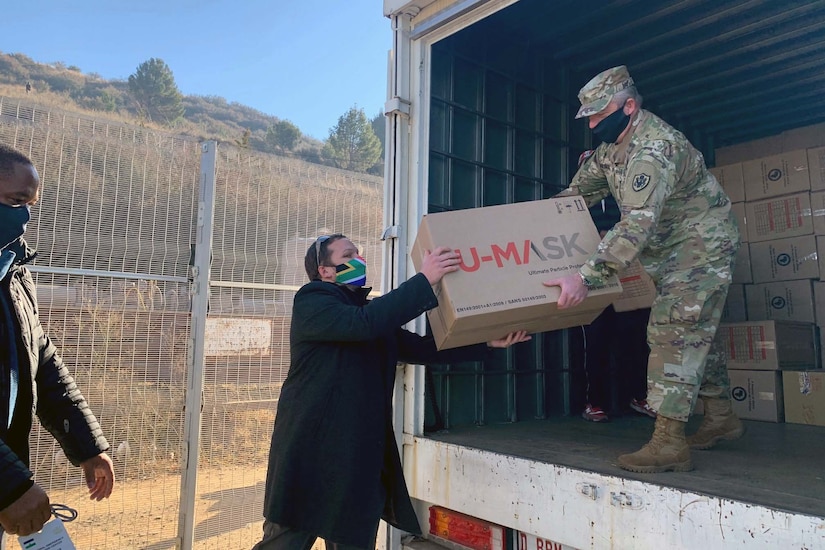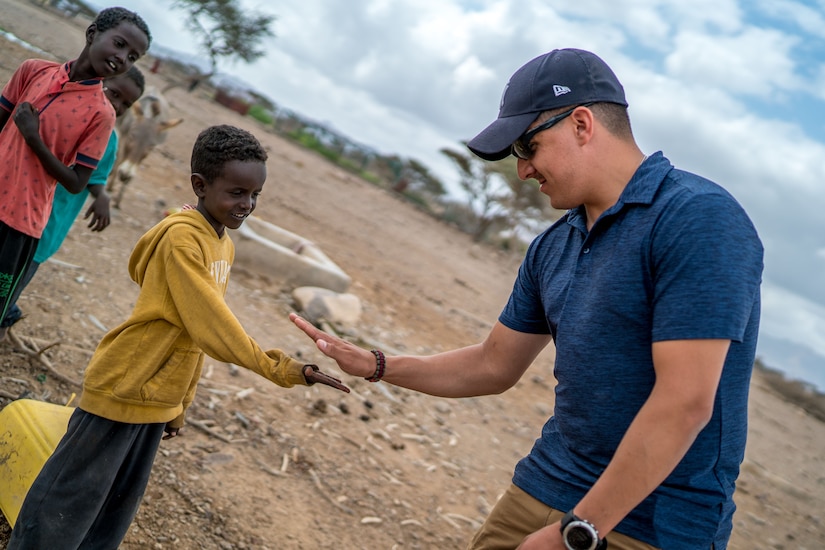April 12, 2021 | , DOD News
Generalizations on Africa are tough to make except for this: U.S. engagement with the nations of the continent is crucial for peace, democracy and development, said acting Deputy Assistant Secretary of Defense for Africa Affairs Ronald W. Meyers during a recent interview.
The Defense Department has a role to play in support of U.S. African policy, but it is very much an enabling role in line with the State Department's overall direction.

The DOD wants to continue building partnerships that will help African nations combat the threats posed by violent extremism. This includes providing humanitarian/disaster assistance, when needed, in areas where the U.S. has played an outsized role in countering pandemics, such as Ebola, and mitigating the harm caused by natural disasters, Meyers said. U.S. Africa Command is the combatant command responsible for military-to-military connections on the continent. The command engages with partners to counter transnational threats and malign actors in order to promote regional security, stability and prosperity.
Africa is not a monolithic entity. The continent has countless mixtures of languages, religions, races, histories and more. What works in Morocco in North Africa will be of limited use in Angola, for example. Understanding these differences and working with the countries individually on the basis of mutual respect and shared interest, while staying cognizant of their colonial legacy, is key to U.S. outreach to the nations of the continent, Meyers said.

Violent extremist organizations are a problem for governments and people throughout the continent, but even these organizations have differences. These differences can range from extorting funds by use of violence to organizations seeking to gain local or regional control to some with more global ambitions, the acting deputy assistant secretary said.
Al-Shabab in Somalia is a group that once held the capital of Mogadishu and was supported by al-Qaida, DOD officials said. The group has suffered setbacks, especially since African Union peacekeepers went into the country in 2007. The troops were from Uganda, Burundi, Ethiopia, Kenya and Djibouti and received some U.S. support. The U.S. launched airstrikes against al-Shabab forces and U.S. trainers have worked to build capability and capacity in Somali government forces – with the ultimate goal of enabling these forces to provide security in lieu of U.S. troops.
Boko Haram is a terror group that is centered in Nigeria, Cameroon, Chad and Niger and affiliated itself with ISIS in 2015. The actions of the group – including the kidnapping of more than 300 schoolgirls in 2014 and the killings of tens of thousands of people – have resulted in the "displacement" of more than 25 million people over the past seven years. The United States, France and the United Kingdom are working with Nigeria, Niger, Cameroon, Benin and Chad as part of a multinational joint task force against the group.
The latest terror group is another al-Shabab group that is affiliated with ISIS. The group seized Palma, a city in Mozambique's Cabo Delgado province. Government troops retook the city, but the group is extremely violent with reports from the city detailing beheadings and torture, but information is sketchy.
These groups, and more, grow in ungoverned, or little governed areas, of the continent. The Sahel region – stretching from East to West Africa – is particularly vulnerable with groups proliferating in Sudan, South Sudan, Southern Algeria, Mali and more.
The problems these groups pose are compounded by external factors, Meyers said. Climate change, desertification, inadequate or non-existent infrastructure, disease and more affect national governments throughout the region. The coming boom in the continent's population will tax these governments and, in fact, the migration challenge seen today will become worse unless the governments can build the capabilities and capacity needed to educate, feed and provide economic opportunities for their peoples, he said.
Africa is also an emerging front in global power competition. China and Russia are looking for any advantage on the continent. China has sponsored infrastructure projects in many nations and has used money lending practices that have strings attached that lead right back to Beijing, DOD officials have said.

"We look to position the United States to be 'the partner of choice' on the continent," Meyers said. "We look to sustainably build national capabilities. Most of this is in the governance and economic sectors, but we are active in the national security sector as well. We do not undermine the economic, political and security institutions. We build them. The Chinese and Russian aid – often just dumped at a dock for a photo op – often increases instability."
The U.S. military's competitive security edge lies with equipment and with the "soup to nuts" paradigm America uses to ensure partner nations can use and sustainably maintain the equipment, Meyers said. U.S. equipment comes with training, education, spare parts and more.
The U.S. military – notably Africom – partners with nations to combat terrorism. The command works with Pan-African groups to encourage regional solutions and security, and it looks to help the nations and groups to find solutions that work in Africa.
There are many nations on the continent that are doing well. "I definitely believe that there's a lot of opportunity there," Meyers said. "We probably sometimes forget the outsize role that African partners or African countries play in not only global affairs, but in the world economy. If the European and Asian nations are investing more on the continent, maybe we should be asking what do they see that we should?"








No comments:
Post a Comment